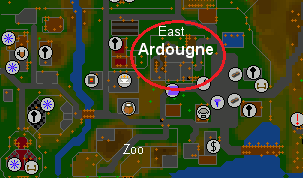

Badass Cape: Capes of Accomplishment, which prove that you have attained the highest level possible for a particular skill.The gods are unable to teleport or do many other things to the player without his/her permission, but they can still take away items and the adventurer can still be hit by the indirect effects of divine magic. Nevertheless, they aren't completely immune. The adventurer also uses their immunity to help ease the pain of a Dragonkin temporarily. Anti-Magic: Thanks to Guthix, the adventurer can No-Sell a lot of godly powers, and it is implied that he made the adventurer unable to ascend into godhood themselves.Though they lack the cosmic might of a deity, Guthix infuses their soul with shadow anima, the antithesis to the regular anima the gods are made of, making them 'not really human.' This offers them some defenses against divine magic. Ambiguously Human: In "Pieces of Hate", the stellar kitten claims that the World Guardian isn't 'really human'.Unfortunately by the time you actually get to marry them, the Cartwright Curse kicks in. Arranged Marriage: Your political engagement with the prince or princess of Miscellania the royal is standoffish because their father has arranged suitors for them before, but showing them constant affection and dedication to their interests wins them over.She'll feel troubled, and offer no response. Armor-Piercing Question: After Kara-Meir announces her intention to acquire the Stone of Jas so she can destroy all the gods, you can respond by asking whether or not that'd make her no different from the gods.Alliance Meter: It doesn't affect much beyond plot flavor, but as of the Sixth Age, the adventurer is occasionally given the option to pick between supporting one of the dominant religious factions and their philosophies.Most commonly referred to as "adventurer" in the Fifth Age, they come to be known as the "World Guardian" upon the beginning of the Sixth Age. According to Jagex, Hans is the first ever NPC created for the game.The Player Character.Due to NPCs only being able to talk to one player at a time, quests were very difficult to complete on their release day in RSC.Instead, text appears in the normal chat window and players can respond to NPCs by clicking on text options in the top-left corner of the game screen. NPCs in RSC do not have their own interface when talking, like in the newer editions. This can make activities such as banking and quests particularly difficult in crowded areas. Unlike in the current version of RuneScape, NPCs in RSC can only talk to one player at a time. NPCs which are attackable are considered monsters.


NPCs are usually involved in activities such as quests and banking or selling items at shops. Players can communicate with most NPCs in the game by choosing the Talk option when right-clicking. A Non-player character (or NPC) is an avatar within RuneScape Classic that is not controlled by other players, but instead by the game engine.


 0 kommentar(er)
0 kommentar(er)
